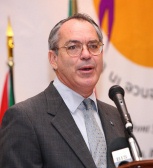Acting PM of The Bahamas supports Geographic Information Systems (GIS) Application
NASSAU, The Bahamas – Bahamas Acting Prime Minister and Minister of Foreign Affairs the Hon. Brent Symonette has given his support to the increased application of information technology in the services of government.
“Information technology will continue to play an increasing role in the future of the Bahamas and I want everyone to know I am committed to this process,” he said.
Mr. Symonette was addressing the opening session Wednesday, November 28, 2007, of a Geographic Information Systems (GIS) seminar for senior and technical officers.

Hon. Brent Symonette
This comes as part of a collaborative effort between the Government and the Inter-American Development Bank to implement the Land Use Planning and Administration Project (LUPAP).
This three-year project has three components – land information modernization, land information management and land use issues and policy guidelines.
As part of the land information management component of the project, the Bahamas National Geographic Information Systems (BNGIS) Centre hosted the two-day seminar at the British Colonial Hilton.
The primary objective of the seminar was to provide a forum for presentations from LUPAP’s executing agencies – the BNGIS Centre and the Department of Lands and Surveys – on project-related topics including the Parcel Information Management System, geographic profiles of Abaco and Inagua and geographic information policy.
Stakeholders in attendance included Oscar Spencer of the Inter-American Development Bank, former Wyoming Governor James Geringer, Carolann Albury, director, BNGIS Centre, and Tex Turnquest, director, Lands and Surveys Department.
Acting Prime Minister Symonette said that on Tuesday, November 27, the Cabinet received a briefing from the executives of the BNGIS Centre. It provided an oversight as to the application of GIS.
“As a result of the Cabinet briefing,” said Mr. Symonette, “I am convinced that the importance of technology in modernizing government and making our services as efficient as possible is critical in order to compete in a global environment.
“This will mean prudent implementation of information technology, GIS being the most visible of the information technologies and perhaps the most powerful, as well.”
It is the Government’s agenda to provide the strategic framework for proper management of change in the physical environment that would facilitate development of orderly, sustainable and attractive communities, he said.
“If we are to be considered as a technology leader in the Caribbean region,” said Mr. Symonette, “we must be efficient in our operations and provide timely delivery of services.
“In order to achieve this position, the government must support the development of a national GIS through the Bahamas Spatial Data Infrastructure Programme (which is currently being reviewed by our legal department) to promote continual improvement in government. We can never compete if we remain complacent.”
Through GIS, he said, the country can improve its ability to manage resources; improve its ability to solve complex social issues relating to land administration, crime, jobs, health and poverty; improve educational opportunities and provide transparency to citizens on issues of national importance.
“Information technology and GIS will continue to play an increasing role in the future of the Bahamas and I want everyone to know I am committed to this process,” Mr. Symonette said.

